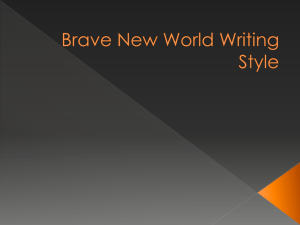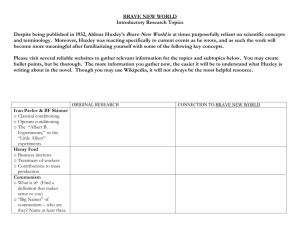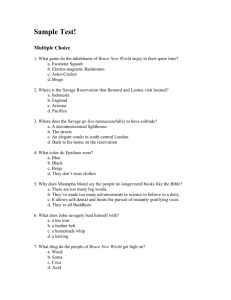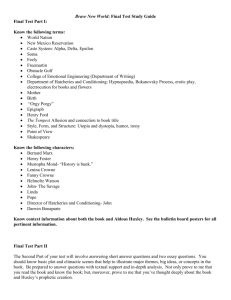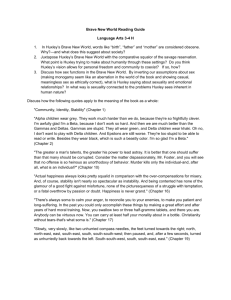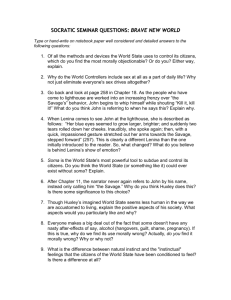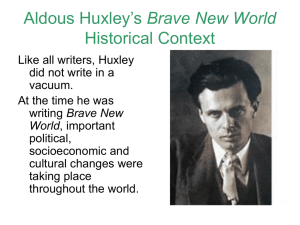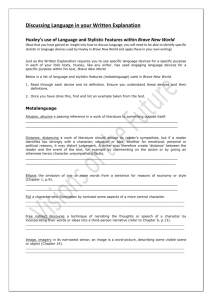Brave New World
advertisement
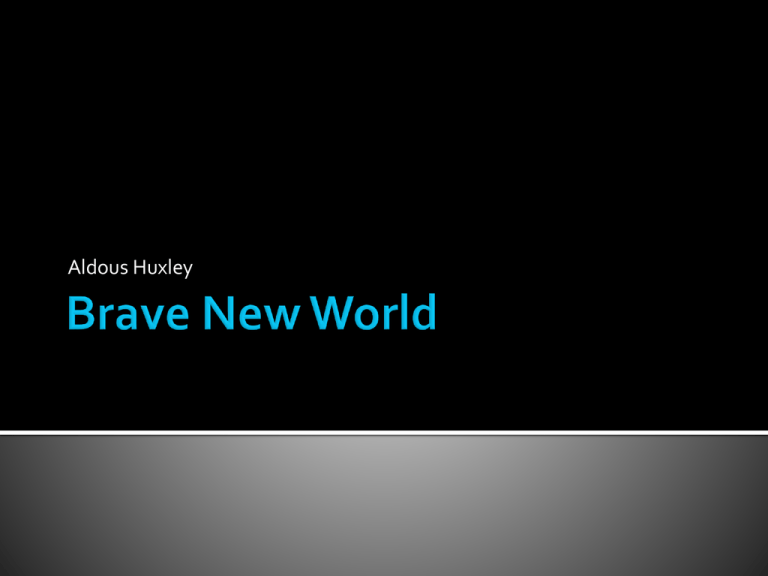
Aldous Huxley Aldous Huxley initially intended to be a doctor, however after a freak accident that left him blind for two years, he was forced to change the direction of his life. He finally regained his eye site and moved to Italy, where he tried his hand at writing. He ended up having a fairly successful career as a writer that spanned over the course of four decades. Eventually Huxley emigrated to the United States where he lived the rest of his days in sunny southern California. As he grew older, Huxley began to experiment with LSD, a mind altering drug he found to be particularly useful for attaining spiritual perception. Brave New World is set in London of AD 2540 (632 A.F. in the book), the novel anticipates developments in reproductive technology and sleep-learning (hypnopeadia) that combine to change society. After a major war that annihilates most of the worlds population, several scientists get together and decided that the cause of the war was human emotion. They eventually decide to recreate human society by ridding all humans of any type of emotion. Brave New World begins many years in the future. The new world emotionless “society” has been created, and characters are carrying on with their normal lives. In 2003, Robert McCrum writing for The Observer listed Brave New World number 53 in "the top 100 greatest novels of all time",[2] and the novel was listed at number 87 on the BBC's survey The Big Read.[3] Brave New World's title derives from Miranda's speech in William Shakespeare's The Tempest, Act V, Scene I: O wonder! How many goodly creatures are there here! How beauteous mankind is! O brave new world, That has such people in't. William Shakespeare, The Tempest Huxley said that Brave New World was inspired by the utopian novels of H.G. Wells, including A Modern Utopia (1905). Wells' hopeful vision of the future's possibilities gave Huxley the idea to begin writing a parody of the novel, which became Brave New World Unlike the most popular optimist utopian novels of the time, Huxley sought to provide a frightening vision of the future. Huxley referred to Brave New World as a "negative utopia" ( dystopia). An early trip to the United States by Huxley gave Brave New World much of its character. Huxley was outraged by the culture of youth, commercial cheeriness, sexual promiscuity and the inward-looking nature of many Americans (and this was in the 1930’s)! For Brave New World, Huxley unsurprisingly received nearly universal criticism from his contemporary critics. However, most current critics view his work as brilliant and visionary. The people of the World State are all part of the caste system. It goes, in descending order, Alphas, Betas, Gammas, Deltas, and Epsilons. Alphas Betas Deltas Epsilons Alphas are the highest caste in the caste system. These people have the highest level of intelligence and attractiveness. They generally wear grey Alpha Plus Intellectuals are the top-ranking alphas. Bernard Marx and Helmholtz Watson are both Alpha Plus Intellectuals. Betas are the second highest caste system. They possess human intelligence, though not as much as Alphas. Mulberry colored; often work as mechanics. Wear green; often work as machine minders/manipulators, butlers, and other semi-thought-provoking jobs Wear khaki, helicopter attendants, cold pressers, screw-cutters, package packers; are mass produced and have no individuality. Wear black, can’t read or write, Sewage Workers, liftmen, foundry-workers, carriers Can’t/Don’t think for themselves Also called sleep teaching (brainwashing). Series of repeated sayings, used to teach children everything from their place in society to clever little sayings and proverbs. Basically, this is a form of mind control. While the children at the Central London Hatcheries and Conditioning Centre are napping, these “lessons” are played time and time again, thousands of times between the ages of three and sixteen. Director of Hatcheries and Conditioning (The Director) – loves to hear himself talk Gives tours of the Hatchery Alpha (secretly) Wonders about life outside of “the society” Lenina Crowne – Beta Young and Beautiful Suffers from Lupus (common in “society” Works in the Embryo room Attracted to Henry Foster (not allowed) Fanny Crowne (no relation to Lenina Crowne) 19 years old Beta Lenina’s friend Accepts “society’s” rules unconditionally Henry FosterScientist in the Hatchery Model citizen Good looking Does not realize that Lenina has a thing for him. Benito HooverFriend and colleague of Henry Foster Huxley took his name from: Hoover (US president) Benito (Italian fascist dictator) He disapproves of events in the novel Bernard Marx Huxley took his name from Karl Marx Alpha Specializes in sleep teaching Does not agree with “society's” rules He is selfish and tries to bend the rules to fit his own needs (not because it would be right) Very unhappy character Mustafa Mond – World controller (similar to president) Secretly indulges in his own passion for knowledge, literature, and history He is a friendly, happy fellow who is faithful to his job and the vision of a utopian society. He is one of the only humans with free will, but he denies it to others. Ultimately, he is loyal to the society and not to humans. John the SavageCentral Character in the novel Is not introduced until the second half Born and raised on an Indian reservation in New Mexico after an accident stranded his pregnant mom, Linda (not to be confused with Lenina). Eventually comes to “society” and cannot understand the lifestyle. LindaBeta-minus Visited an Indian reservation and fell, injuring herself. She was left there and gave birth to her son on the reservation. She is very embarrassed of her life on the reservation.
